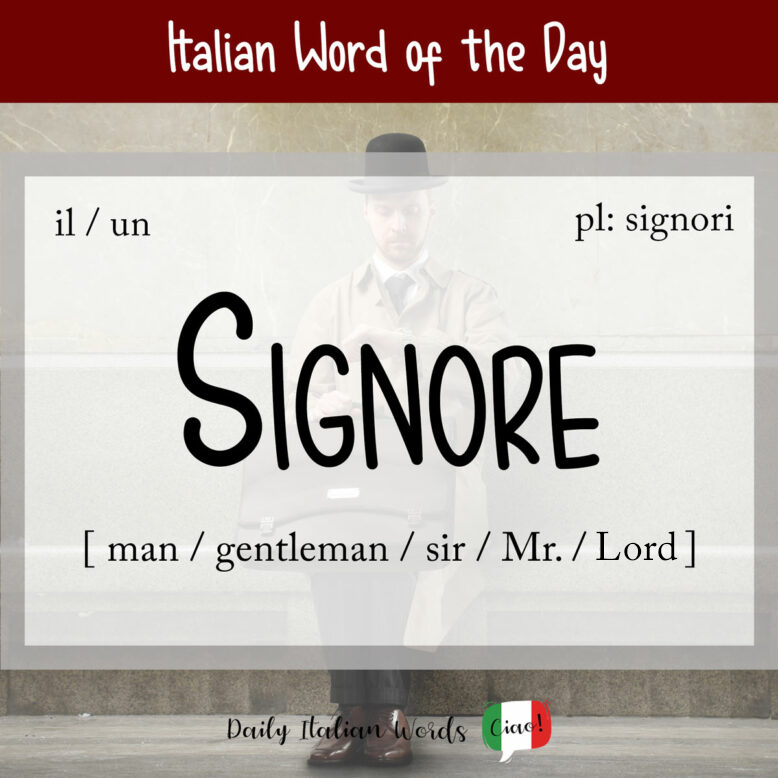The polite way to refer to man in Italian is signore. It differs from uomo in that the latter is less polite and is used to generically refer to a human being or mankind.
signore

It should come as little surprise that signore is a masculine noun, and therefore, it is used with the following definite and indefinite articles.
- il signore = the man
- i signori = the men
- un signore = a man
- dei signori = (some) men
According to Treccani, the word is derived from the Latin word senior -ōris, which referred to a mature man typically between the ages of 45 and 60, and is the comparative form of senex, meaning “old.”
When used to address a man directly, it equates to the English sir.
Mi scusi, signore, credo che sia sua moglie al telefono.
Excuse me, sir, I think your wife is on the line.
In military jargon, it’s common to use the following positive and negative responses when addressing a superior: sissignore / signorsì (yessir) and nossignore / signornò (nosir), written and pronounced as one word.
Just as the English Mister or Mr. appear before the surnames or full names of men, so too does signor (without the final e), often in its abbreviated form sig. Note that sig. is never capitalised like Mr. in English.
Il signor Rossi vorrebbe parlare con voi.
Mr. Rossi would like to speak to all of you.

For many years, signore was also used when addressing a professional or someone with a noble title such as a lord. Domestic servants, in particular, would use this term when addressing the head of the household.
Mi dispiace ma il signore non è in casa.
I’m sorry but the master isn’t at home.
Il Signore, with a capital S, is the equivalent of The Lord in English.
Che il Signore vi benedica.
May the Lord bless you.

Expect to hear this word uttered in the exclamation of frustration Oh, Signore! which is identical to the English Oh, good lord!
The diminutive form of signore is signorino which means “young master”. In the past, domestic servants would use this term to describe the master’s son. Today it can be used as a funny nickname or term of endearment towards one’s own son.
The feminine equivalent of signore is signora, and as you have probably guessed, it is a polite term for a woman / lady. Somewhat confusingly for learners, signore is also the plural of signora, and the only way to tell the difference between the two is by looking at the article.
Signore e signori, che lo spettacolo abbia inizio!
Ladies and gentlemen, let the show begin!
Two additional meanings for signore include a gentleman with refined manners, or in its plural form, a group of powerful people with nearly absolute control due to their position, rank, and economic means in a country or society (e.g. i signori delle banche).
It may also be used to describe a rich man, particularly in the phrase fare il signore, which literally translates to “to play the gentleman”. It is used to describe a man who lives off his family’s wealth, often in a manner that exceeds his means.
To conclude this rather long article, here is a scene in Italian from my favourite movie of all time, Il Signore degli Anelli (The Lord of the Rings)! You can turn on the subtitles as well (auto-generated).
Heather Broster is a graduate with honours in linguistics from the University of Western Ontario. She is an aspiring polyglot, proficient in English and Italian, as well as Japanese, Welsh, and French to varying degrees of fluency. Originally from Toronto, Heather has resided in various countries, notably Italy for a period of six years. Her primary focus lies in the fields of language acquisition, education, and bilingual instruction.


